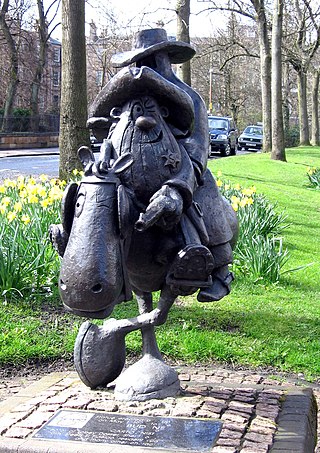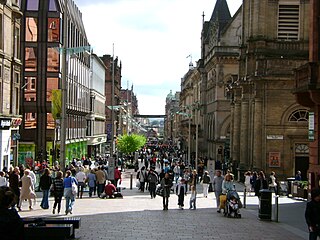Celtic, Celtics or Keltic may refer to:
Glasgow is the largest city in Scotland.

Maryhill is an area in the north-west of Glasgow in Scotland. A former independent burgh and the heart of an eponymous local authority ward, its territory is bisected by Maryhill Road, part of the A81 road which runs for a distance of roughly three miles between Glasgow city centre and the suburban town of Bearsden.
The Glasgow dialect, also called Glaswegian, varies from Scottish English at one end of a bipolar linguistic continuum to the local dialect of West Central Scots at the other. Therefore, the speech of many Glaswegians can draw on a "continuum between fully localised and fully standardised". Additionally, the Glasgow dialect has Highland English and Hiberno-English influences owing to the speech of Highlanders and Irish people who migrated in large numbers to the Glasgow area in the 19th and early 20th centuries. While being named for Glasgow, the accent is typical for natives across the full Greater Glasgow area and associated counties such as Lanarkshire, Renfrewshire, Dunbartonshire and parts of Ayrshire, which formerly came under the single authority of Strathclyde. It is most common in working class people, which can lead to stigma from members of other classes or those outside Glasgow.
Glasgow City or City of Glasgow may refer to:

James Kelman is a Scottish novelist, short story writer, playwright and essayist. His fiction and short stories feature accounts of internal mental processes of usually, but not exclusively, working class narrators and their labyrinthine struggles with authority or social interactions, mostly set in his home city of Glasgow. Frequently employing stream of consciousness experimentation, Kelman's stories typically feature "an atmosphere of gnarling paranoia, imprisoned minimalism, the boredom of survival.".
The Glasgow Fair is a holiday usually held during the second half of July in Glasgow, Scotland. 'The Fair' is the oldest of similar holidays and dates to the 12th century. The fair's earliest incarnation occurred in 1190, when Bishop Jocelin obtained permission from King William the Lion to hold the festivities.
This article deals with the Media in Glasgow. The city of Glasgow, Scotland is home to large sections of the Scottish national media. It hosts the following:
Galwegian or Galwegians may refer to:

Wyndford is an area of the city of Glasgow, Scotland. Located two miles northwest of the city centre in Maryhill, Wyndford is bounded by Maryhill Road to the north and the River Kelvin to the south. The area comprises council housing that is typical of that which was built throughout Glasgow in the 1960s and 1970s. The houses are now either privately owned or mainly run by Wheatley Homes Glasgow. The community is represented by the Wyndford Residents Union, who oppose the proposed demolition of four high-rise tower blocks in the area and are, as of March 2024, involved in a legal dispute with Glasgow City Council over the demolition.

William "Bud" Neill was a Scottish cartoonist who drew cartoon strips for a number of Glasgow-based newspapers between the 1940s and 1960s. Following his death, his work has attained cult status with a worldwide following.
Jenny Lind was a Swedish opera singer.

The Glasgow effect is a contested term which refers to the lower life expectancy of residents of Glasgow compared to the rest of the United Kingdom and Europe. The phenomenon is defined as an "[e]xcess mortality in the West of Scotland (Glasgow) after controlling for deprivation." Although lower income levels are generally associated with poor health and a shorter lifespan, epidemiologists have argued that poverty alone does not appear to account for the disparity found in Glasgow. Equally deprived areas of the UK such as Liverpool and Manchester have higher life expectancies, and the wealthiest ten percent of the Glasgow population have a lower life expectancy than the same group in other cities. One in four men in Glasgow will die before his sixty-fifth birthday.
Joseph Morris Henderson RSA (1863–1936) was a Scottish Glaswegian landscape, portrait, genre and coastal scenery oil and watercolour painter. He was born and died in Glasgow.
John Henderson (1860-1924) was a Scottish Glaswegian landscape and portrait painter and Director of Glasgow School of Art
People's Palace may refer to:
This page is based on this
Wikipedia article Text is available under the
CC BY-SA 4.0 license; additional terms may apply.
Images, videos and audio are available under their respective licenses.




